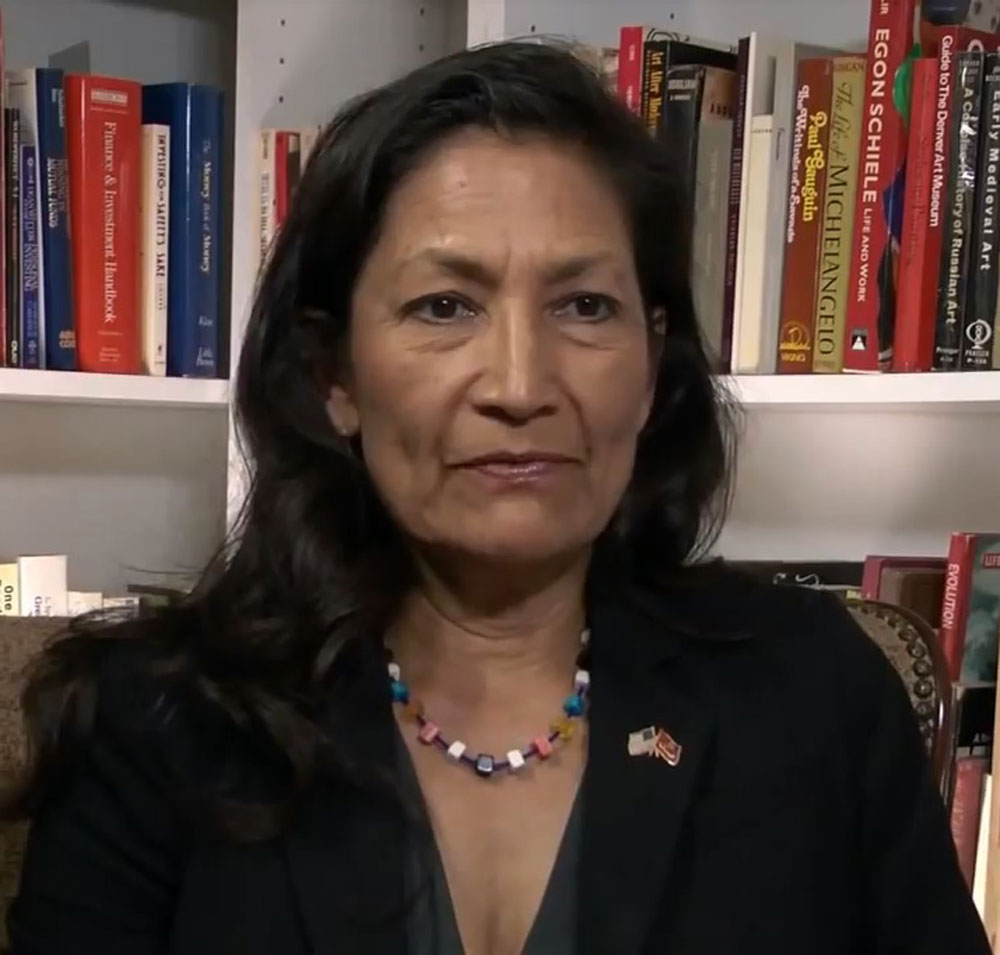
November 18, 2020; Vox and Indian Country Today
In a letter sent to Joe Biden, 120 elected tribal leaders and intertribal organization officials requested that the president-elect consider US Representative Deb Haaland (D-NM, Laguna Pueblo) for the post of Secretary of the Interior. The Hill reported Biden’s transition team is in the process of vetting her for the position. If she were to be named Interior secretary, she would be the first Native American ever to hold a presidential cabinet post.
Others in consideration include Tom Udall and Martin Heinrich, both Democratic senators from New Mexico. Haaland, however, would be a compelling choice. As Interior Secretary, Haaland would oversee matters concerning tribal land, Indigenous affairs, and Indigenous sovereign education, among other responsibilities.
Haaland has also been endorsed by her colleague, House Natural Resources committee chair Raúl Grijalva (D-AZ). Grijalva, who himself was being promoted by the Congressional Hispanic Caucus for the Interior post, urged his fellow caucus members to back Haaland instead. In a letter to his colleagues, Grijalva wrote:
It is well past time that an Indigenous person brings history full circle at the Department of Interior. As her colleague on the Natural Resources Committee, I have seen first-hand the passion and dedication she puts into these issues at the forefront of the Interior Department, from tackling the epidemic of missing and murdered Indigenous women to crafting thoughtful solutions to combating the climate crisis using America’s public lands.
Haaland, in short, has a lot of support, and she is attracting increasing attention on Capitol Hill. As it happens, November is also Native American Heritage month, and one way to celebrate it is the #RockYourMocs campaign, a nationwide event that began in 2011 and encourages people to wear their favorite moccasins, take a picture, and share it online. This past Tuesday, Native social media exploded when Haaland (D-NM) shared her moccasins photo, taken on the Capitol floor:
Mocs on the Capitol floor. This photo says a lot about how far we’ve come as a country. How are you rocking your mocs this week? #RockYourMocs #NativeAmericanHeritageMonth pic.twitter.com/eICSPVlQux
Sign up for our free newsletters
Subscribe to NPQ's newsletters to have our top stories delivered directly to your inbox.
By signing up, you agree to our privacy policy and terms of use, and to receive messages from NPQ and our partners.
— Rep. Deb Haaland (@RepDebHaaland) November 17, 2020
“I’m actually crying…this is so beautiful and such a long time coming…” was one of the many responses Haaland received on Twitter as Native people took pride in reclaiming their heritage and their growing influence at all levels of government.
At the national level, Native American representation in Congress is at its highest in history. The shift began with the victory of Haaland and US Representative Sharice Davids (D-KS, Ho Chunk) in 2018, the first two Native American women ever elected to Congress. Two more Native Americans will join them in Congress in January. Yet, that political power is not monolithic: half of the six Native American representatives are Democrats, and half are Republican.
Haaland’s leadership has been recognized as inspirational and influential, strengths Native American leaders hope will lead to her being named to join Biden’s cabinet. She not only oversaw the signing into law of two of the most significant pieces of legislation to protect Native women rights against violence—Savanna’s Act and the Not Invisible Act—but she’s also launched proposals at the heart of Native issues towards liberation, such as multiple laws related to urgent COVID-19 assistance, establishing a Native American language resource center, extending tribal broadband access, promoting mental health justice, promoting energy resilience and environmental justice, and reviewing offensive names in federal lands, among others.
The Progress for Indian Tribes Act, which promotes tribal self-governance, and the Native American Business Incubators Program Act, which focuses on economic development, were two pieces of legislation signed into law this past October, thanks in large part to Haaland’s leadership.
When asked about being considered for the cabinet, Haaland told Vox, “There’s no doubt it would be historic. It would be symbolic, and it would be profound, especially when we think about how the federal government essentially threw out their federal Indian policies throughout the centuries and tried to exterminate Native Americans across the country.”—Sofia Jarrin and Steve Dubb











